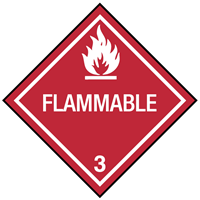
 Print
Print
Chemical Datasheet
ETHYL LACTATE |

|
Chemical Identifiers
| CAS Number |
UN/NA Number |
DOT Hazard Label |
USCG CHRIS Code |
- 97-64-3

|
|
|
|
| NIOSH Pocket Guide |
International Chem Safety Card |
|
none
|
none
|
NFPA 704
General Description
A clear colorless liquid with a mild odor. Flash point 115°F. Denser than water and soluble in water. Vapors heavier than air.
Hazards
Reactivity Alerts
none
Air & Water Reactions
Flammable. Soluble in water.
Fire Hazard
Excerpt from ERG Guide 129 [Flammable Liquids (Water-Miscible / Noxious)]:
HIGHLY FLAMMABLE: Will be easily ignited by heat, sparks or flames. Vapors may form explosive mixtures with air. Vapors may travel to source of ignition and flash back. Most vapors are heavier than air. They will spread along the ground and collect in low or confined areas (sewers, basements, tanks, etc.). Vapor explosion hazard indoors, outdoors or in sewers. Those substances designated with a (P) may polymerize explosively when heated or involved in a fire. Runoff to sewer may create fire or explosion hazard. Containers may explode when heated. Many liquids will float on water. (ERG, 2024)
Health Hazard
Inhalation of concentrated vapor may cause drowsiness. Contact with liquid causes mild irritation of eyes and (on prolonged contact) skin. Ingestion may cause narcosis. (USCG, 1999)
Reactivity Profile
ETHYL LACTATE is an ester. Esters react with acids to liberate heat along with alcohols and acids. Strong oxidizing acids may cause a vigorous reaction that is sufficiently exothermic to ignite the reaction products. Heat is also generated by the interaction of esters with caustic solutions. Flammable hydrogen is generated by mixing esters with alkali metals and hydrides.
Belongs to the Following Reactive Group(s)
- Alcohols and Polyols
- Esters, Sulfate Esters, Phosphate Esters, Thiophosphate Esters, and Borate Esters
Potentially Incompatible Absorbents
Use caution: Liquids with this reactive group classification have been
known to react with the
absorbent
listed below.
- Cellulose-Based Absorbents
Response Recommendations
Isolation and Evacuation
Excerpt from ERG Guide 129 [Flammable Liquids (Water-Miscible / Noxious)]:
IMMEDIATE PRECAUTIONARY MEASURE: Isolate spill or leak area for at least 50 meters (150 feet) in all directions.
LARGE SPILL: Consider initial downwind evacuation for at least 300 meters (1000 feet).
FIRE: If tank, rail tank car or highway tank is involved in a fire, ISOLATE for 800 meters (1/2 mile) in all directions; also, consider initial evacuation for 800 meters (1/2 mile) in all directions. (ERG, 2024)
Firefighting
Excerpt from ERG Guide 129 [Flammable Liquids (Water-Miscible / Noxious)]:
CAUTION: The majority of these products have a very low flash point. Use of water spray when fighting fire may be inefficient.
SMALL FIRE: Dry chemical, CO2, water spray or alcohol-resistant foam. Do not use dry chemical extinguishers to control fires involving nitromethane (UN1261) or nitroethane (UN2842).
LARGE FIRE: Water spray, fog or alcohol-resistant foam. Avoid aiming straight or solid streams directly onto the product. If it can be done safely, move undamaged containers away from the area around the fire.
FIRE INVOLVING TANKS, RAIL TANK CARS OR HIGHWAY TANKS: Fight fire from maximum distance or use unmanned master stream devices or monitor nozzles. Cool containers with flooding quantities of water until well after fire is out. Withdraw immediately in case of rising sound from venting safety devices or discoloration of tank. ALWAYS stay away from tanks in direct contact with flames. For massive fire, use unmanned master stream devices or monitor nozzles; if this is impossible, withdraw from area and let fire burn. (ERG, 2024)
Non-Fire Response
Excerpt from ERG Guide 129 [Flammable Liquids (Water-Miscible / Noxious)]:
ELIMINATE all ignition sources (no smoking, flares, sparks or flames) from immediate area. All equipment used when handling the product must be grounded. Do not touch or walk through spilled material. Stop leak if you can do it without risk. Prevent entry into waterways, sewers, basements or confined areas. A vapor-suppressing foam may be used to reduce vapors. Absorb or cover with dry earth, sand or other non-combustible material and transfer to containers. Use clean, non-sparking tools to collect absorbed material.
LARGE SPILL: Dike far ahead of liquid spill for later disposal. Water spray may reduce vapor, but may not prevent ignition in closed spaces. (ERG, 2024)
Protective Clothing
Goggles or face shield; rubber gloves. (USCG, 1999)
DuPont Tychem® Suit Fabrics
No information available.
First Aid
INHALATION: remove victim to fresh air.
EYES and SKIN: flush well with water.
INGESTION: induce vomiting; get medical attention. (USCG, 1999)
Physical Properties
Flash Point:
115°F
(USCG, 1999)
Lower Explosive Limit (LEL):
1.5 %
(USCG, 1999)
Upper Explosive Limit (UEL):
11.4 %
(USCG, 1999)
Autoignition Temperature:
752°F
(USCG, 1999)
Melting Point: data unavailable
Vapor Pressure: data unavailable
Vapor Density (Relative to Air): data unavailable
Specific Gravity:
1.03
at 68°F
(USCG, 1999)
- Denser than water; will sink
Boiling Point:
309°F
at 760 mmHg
(USCG, 1999)
Molecular Weight:
118.1
(USCG, 1999)
Water Solubility: data unavailable
Ionization Energy/Potential: data unavailable
IDLH: data unavailable
AEGLs (Acute Exposure Guideline Levels)
No AEGL information available.
ERPGs (Emergency Response Planning Guidelines)
No ERPG information available.
PACs (Protective Action Criteria)
No PAC information available.
Regulatory Information
EPA Consolidated List of Lists
No regulatory information available.
CISA Chemical Facility Anti-Terrorism Standards (CFATS)
No regulatory information available.
OSHA Process Safety Management (PSM) Standard List
No regulatory information available.
Alternate Chemical Names
- ACTYLOL
- ACYTOL
- DL-ETHYL LACTATE
- DL-LACTIC ACID, ETHYL ESTER
- ETHYL 2-HYDROXYPROPANOATE
- ETHYL 2-HYDROXYPROPIONATE
- (.+-.)-ETHYL 2-HYDROXYPROPIONATE
- ETHYL ALPHA-HYDROXYPROPIONATE
- ETHYL DL-LACTATE
- ETHYL LACTATE
- (.+-.)-ETHYL LACTATE
- ETHYL RAC-LACTATE
- 2-HYDROXYPROPANOIC ACID ETHYL ESTER
- (.+-.)-LACTIC ACID ETHYL ESTER
- LACTIC ACID, ETHYL ESTER
- PURASOLV ELS
- SOLACTOL


 Print
Print
